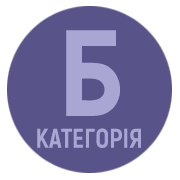ENRICHMENT OF THE VOCABULARY OF THE UKRAINIAN LANGUAGE WITH NEOLOGISMS OF THE MODERN WAR PERIOD
DOI:
https://doi.org/10.32782/philspu/2024.5.2Keywords:
neologism, lexical innovation, neological lexeme, Russian-Ukrainian war, method of word formationAbstract
The article deals with lexical-semantic and structural-word-forming analysis of neologisms of the Ukrainian language which appear during the modern Russian-Ukrainian war and function mainly in the Internet space. Neologisms are considered as words or some their meanings that appeared in the language at the modern stage of its development and the novelty of which is realized by speakers (common neologisms) or were used only in a speech act, a text or a certain author’s work (stylistic or individually-author’s neologisms). The author proves that the most productive methods of word formation for neologisms of the modern war period are the morphological ones, in particular suffixation, confixation, compounding. It was found that a significant part of lexical innovations was formed by contamination which means the superimposition of lexeme’s structural elements on another lexeme. It was revealed that one of the productive methods of creating neolexemes of the modern period was the lexical-semantic method – reinterpretation of the meanings of the words. The article confirms the opinion that the new vocabulary of a certain historical period always reflects information about the features of the political, economic, and cultural life of society in this era. And the more important, sometimes more tragic the period of the formation and development of society is, the more actively the language reacts with the appearance of new words that provide both the needs of society and the needs of the language itself. In addition, it has been proven that the tragic social events of recent years caused the appearance of a large number of neologisms, which continue to appear mainly in the modern Internet space, to be included in the system of the Ukrainian language, replenishing its vocabulary; however, some new words remain occasional elements of individual speakers’ speech.
References
Вусик Г. Л., Павлик Н. В. Неологізми як мовне відображення російсько-української війни 2022 року. Закарпатські філологічні студії. 2022. Вип. 23. Том 1. С. 52–57.
Гладченко А. М., Комарова О. С. Неологізація лексики у період російсько-української війни. Вчені записки ТНУ імені В І. Вернадського. Серія: Філологія. Журналістика. 2023. Том 34 (73). № 1. Ч. 1. С. 7–13.
Гмиря Л., Заскалета В. Морфологічні та дериваційні особливості неологізмів воєнного часу. Актуальні питання гуманітарних наук. Мовознавство. Літературознавство. 2023. Вип. 60. Том 1. С. 159–165.
Городиловська Г. П. Метафоризація як лексико-семантичний спосіб творення воєнних неологізмів. Наукові записки. Серія: Філологічні науки. 2023. № 207. С. 54–61.
Гриценко С. Мовні інновації російсько-української війни 2022 року. Вісник Київського національного університету імені Тараса Шевченка. Літературознавство. Мовознавство. Фольклористика. 2022. № 2 (32). С. 9–13.
Даниленко В. Неологізми в мережевих виданнях України доби незалежності. Український інформаційний простір. 2023. № 1 (11). С. 149–162. URL: http://ukrinfospace.knukim.edu.ua/article/view/279624/274204.
Демешко І. М. Лексико-словотвірні інновації в медіадискурсі періоду війни. Наукові записки. Серія: Філологічні науки. Випуск 2 (205). Кропивницький : Видавничий дім «Гельветика», 2023. С. 58–63.
Кирилюк О. Л. «Вогнехреще» або неологізми як відображення військового протистояння. Наукові записки КДПУ. Серія: Філологічні науки (мовознавство). Кіровоград : Лисенко В. Ф., 2015. Вип. 137. С. 52–56.
Шевчук Л. В. Словотвірна контамінація як вияв лінгвокреативності на феномен війни (на матеріалі медіатекстів). Записки з українського мовознавства. 2022. № 9. С. 172–185.







